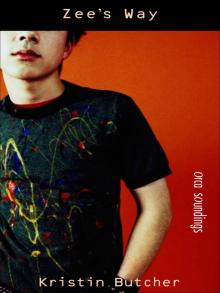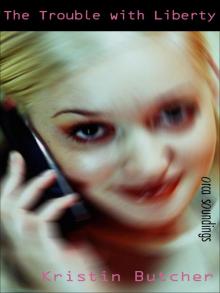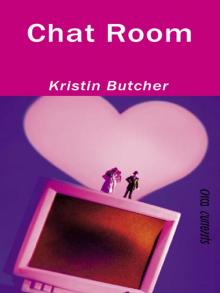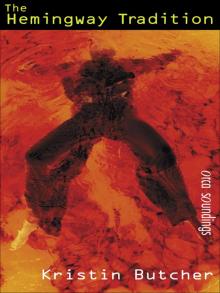- Home
- Kristen Butcher
Zee's Way
Zee's Way Read online
Zee’s Way
Kristin Butcher
orca soundings
Copyright © 2004 Kristin Butcher
All rights reserved. No part of this publication may be reproduced or transmitted in any form or by any means, electronic or mechanical, including photocopying, recording or by any information storage and retrieval system now known or to be invented, without permission in writing from the publisher.
National Library of Canada Cataloguing in Publication Data
Butcher, Kristin
Zee’s way / Kristin Butcher.
(Orca soundings)
ISBN 1-55143-279-X
I. Title. II. Series.
PS8553.U6972Z43 2004 jC813’.54 C2004-900488-3
Summary: Zee is torn between making a
statement with graffiti and making art.
First published in the United States, 2004
Library of Congress Control Number: 2004100594
Orca Book Publishers gratefully acknowledges the support for its publishing programs provided by the following agencies: the Government of Canada through the Book Publishing Industry Development Program (BPIDP), the Canada Council for the Arts, and the British Columbia Arts Council.
The author gratefully acknowledges the financial support provided by the Canada Council for the Arts during the writing of this book.
Cover design: Lynn O’Rourke
Cover photography © GettyImages
In Canada: Orca Book Publishers
1030 North Park Street
Victoria, BC Canada
V8T 1C6
In the United States:
Orca Book Publishers
PO Box 468
Custer, WA USA
98240-0468
Printed and bound in Canada
on New Leaf Eco, 100% post consumer waste paper
07 06 05 04 • 5 4 3 2 1
For my grade seven teacher,
William Russell Donaldson,
who encouraged me to write.
—K.B.
Other titles by Kristin Butcher,
published by Orca Book Publishers
The Trouble With Liberty
(Orca Soundings)
The Hemingway Tradition
(Orca Soundings)
Cairo Kelly and the Mann
The Gramma War
Chapter One
I pushed open the bedroom window and stuck my head into the night. The rain had stopped right on schedule, and the clouds that had brought it were already scudding away. It had been like that all summer—hot sunny days, humid evenings and then—just after midnight—an hour of rain. Perfect conditions for a war.
Not that I wanted a war. None of the guys did. All we were after was a place to hang out. It was the merchants at Fairhaven Shopping Center who were looking for a fight.
As I stuffed the last of the cans into my pack, I thought back to the day Horace and I had visited the half-built mall. In an old neighborhood like ours, any kind of construction was worth checking out, but the guys and I had a real stake in this development. Before the dozers had come in and leveled everything, it had been our hangout. Maybe only an abandoned warehouse and parking lot to everybody else, but for us it was a place to chill. We could skateboard there, toss a baseball, kick a soccer ball or just get out of the rain.
At first we were super-ticked at being evicted, but after we got over the initial shock, we started thinking a shopping center might be just as good—even better if it meant an arcade or a fast-food joint. The thing is, we never got to find out. Two minutes after we stepped onto the site, some lunatic came after us with a crowbar.
For what? All we were doing was having a look around. Since when was that a crime?
“Don’t get all bent out of shape about it,” my dad said when I told him what had happened. “That shopping strip has been financed by the businesses moving into it. Those merchants are just protecting their investment.”
I shook my head and walked away. I should have known my dad would take their side.
I zipped my backpack and slung it over my shoulder. Then I boosted myself onto the window ledge, swung my legs over the sill and dropped to the ground. Staying in the shadows, I peered at the old, shingled houses crowding the street. If any of the neighbors saw me taking a midnight stroll, my dad would know about it before breakfast. Then I’d have some explaining to do. But aside from the streetlamps, Barrett Avenue was dark. Mrs. Lironi’s living room light was on, but that didn’t mean she was up. She Kristin Butcher just kept the light on to discourage burglars. Everyone knew that—even the burglars.
I jogged across the yard and hurdled the hedge. My shadow stretched along the road beside me, bent arthritically where it climbed the curb. From the corner of my eye, I could see it matching my pace, and I was grateful for the company. I ran past a soggy flyer plastered to the sidewalk. It reminded me of the one the shopping center had put out for its grand opening.
That had been a huge event. Everyone in the neighborhood had come out for the bargains. Two for one at Oscar’s Video Emporium, no GST at The Loonie Bin and 25 percent off all prescriptions at Fairhaven Drugs. Mario’s Coffee Bar was selling large cappuccinos for the price of small ones, and there were free deli samples at Jackman’s Market.
There was stuff going on in the parking lot too. Barbecues were sizzling up hot dogs and hamburgers. A clown with size thirty shoes was making balloon animals. Another one was painting faces. There was even a marching band. The local radio station was there too.
The guys and I showed up around one o’clock. By that time the place was so packed we could barely move. I squinted up at the white banner stretched across the storefronts. Fairhaven Shopping Center— Grand Opening! Something for Everyone, it said in huge blue letters.
But the second we arrived, the party was over. Oh, the festivities didn’t stop; we just weren’t allowed to be part of them.
It was discrimination, plain and simple. Not that the merchants came right out and told us to get lost. They just acted like we weren’t there. Except when they thought we weren’t looking. Then they couldn’t stop staring.
Okay, so the five of us don’t exactly blend into a crowd. Danny’s got blue hair and Horace’s head is shaved. Benny’s lip is pierced, Mike has a thing for leather and studs, and we all have tattoos. So what! If our money’s good, it shouldn’t matter what we look like.
Try telling that to the Fairhaven merchants. Their minds were made up. They didn’t want us around—not that first day or any day after that.
Whenever we’d go into a store, someone would follow us. Don’t handle the merchandise. Don’t read the magazines. Don’t block the aisles. It was a song that played just for us. Women pushing strollers could jam the aisles. Old people could pick up the merchandise. Middle-aged men could browse the magazines. It was just fifteen-year-old guys who weren’t allowed.
It was the same thing outside the stores. All we had to do was stand on the walkway in front of a shop and the owner would glare at us until we moved on. We couldn’t even skateboard through the parking lot without getting yelled at. But since we had nowhere else to go, we put up with it.
Until the No Loitering signs went up. That’s when we decided it was time to take a stand. Not that we really did anything different than what we were already doing. We just did more of it. And we did it on purpose.
Except for breaking the window in Jack-man’s Market. That was a total accident.
It was a Sunday morning. The shopping center wasn’t open yet, so we were using the parking lot as a soccer field. The problem was that Benny didn’t know his own strength. Before any of us realized what had happened, he’d kicked the ball through Jackman’s window and set off the alarm.
We didn’t wait around for the pol
ice. Accident or not, we knew we’d be blamed. And we were right. The store owners said the soccer ball was all the proof they needed. From then on they treated us like criminals. We were only allowed in a store two at a time—and only for five minutes. When we came out, we had to clear off the property completely. If we stood around for even thirty seconds, a police cruiser would show up.
I looked at the sky. The clouds were completely gone now, and I could see the glow of the shopping center lights ahead.
On the corner of Madison and Harper, I pressed close to a big oak tree and peered up and down the deserted street. Then when I was sure the coast was clear, I bolted across the road.
Feniuk’s Hardware was the last store on the strip. There was nothing between it and the sidewalk except a Dumpster. I ducked behind the Dumpster and gazed up at the wall of the store. Bathed in the light of a nearby streetlamp, it was embarrassingly white and empty.
I pulled one of the spray cans from my backpack and began shaking it. Then I looked at the wall again.
It wouldn’t be empty for long.
Chapter Two
The reason I painted the wall at night was so no one would see me. But darkness—the thing that makes night a good time for hiding—also makes it a crummy time for painting. Darkness blurs lines and erases details. And it sucks the life out of spray paint until every color looks gray.
So when I returned to the scene of the crime the next morning, it was like I was seeing that graffiti for the first time. I had no sooner stepped onto Madison Boulevard than the three-foot-high words started screaming at me!
My first impulse was to hurl myself at the wall and smother them into silence. My second impulse was to make a run for it. But I didn’t do either of those things.
Instead, I went and stood beside Horace, who was leaning against the oak tree.
He wagged a thumb at the wall and the stunned shopkeepers huddled in front of it. “You did that?” There was surprise in his voice.
“Yeah. So?” I muttered defensively. Last night the graffiti had seemed like a good idea, but now I wasn’t so sure.
Horace’s big face broke into a grin. He shrugged. “I’m just surprised, that’s all. I mean, it’s not like the paintings you usually do, is it?”
“That’s because it’s not a painting,” I corrected him. “It’s graffiti.” I didn’t want anybody confusing what was on the wall with real art.
Horace shrugged. “Graffiti, painting—it’s all the same to me.” Then he gave me a hip check that moved me over a couple of feet.
“Hey!” I protested.
Horace flexed his arm and admired the barbwire tattoo circling his bicep. “Sorry, man. Sometimes I forget my own strength.”
I couldn’t argue with that. Horace was built like a small mountain, and even his good-natured nudging tended to leave bruises.
“How come you didn’t let me in on the plan?” he asked.
“Because I didn’t have a plan,” I said. “The idea just sort of came to me when I found the spray paint in my basement.”
Horace nodded and pointed toward the shopping center. “Looks like things are heating up over there. If the old lady from the flower shop waves her arms any faster she’s gonna go up like a helicopter.” He laughed at his own joke and then shouted across the street, “Nice paint job! Who’s your decorator?”
The merchants swiveled toward the sound, their curiosity turning to anger as soon as they saw us. Then the owner of Jackman’s Market began stomping toward the road. Horace and I kept leaning against the tree. Be cool, I told myself as the muscles in my legs tensed for takeoff.
One of the other merchants grabbed Jackman’s arm. “Forget it, Leo,” he said. “They’re just trying to get your goat. Don’t give them the satisfaction.”
Jackman stopped. He glowered at us. Then he shook his fist. “Punks!” he yelled. “That’s what you are—punks! Sneaky, good-for-nothing punks!” He waved his arm at the wall. “Look at this mess! You’ve got no right defacing people’s property like that.”
“And you got no right accusing people of a crime without any proof!” Horace yelled back.
Technically, he was right. The merchants didn’t have any proof, so they shouldn’t assume we were the ones who’d done the graffiti. But the truth is, we had done it—well, I had anyway. Suddenly I felt like a criminal.
Jackman dismissed Horace’s objection. “You haven’t even got the guts to own up to what you did. Not that I’m surprised. Punks, I tell you. Somebody ought to take a belt to your backsides.”
Horace sauntered to the curb and leaned out over the pavement. “Oh yeah? Like who, for instance? You?” Then he snorted and strolled back to the tree.
It was a dare, and Jackman took it. Purple with rage, he charged onto the road.
Beeeeeeeeep!!
From out of nowhere a car came speeding toward him. Jackman’s arms went up and then he spun away and fell.
I stopped breathing. Time stopped ticking. It felt like we were going to be caught in that second forever.
Then suddenly everything started moving again. The shopkeepers rushed onto the road, and Jackman struggled to his knees. He hadn’t been hit.
But the incident had shaken the merchants up enough that they forgot about Horace and me and headed back to their stores.
“We win that round,” Horace announced after they’d gone.
“Maybe,” I replied, “but you know they’re—”
A bunch of clatters and clangs cut me off. Feniuk, the old guy from the hardware store, was trying to get a metal ladder out of his shop. It took a while, but he eventually won, leaned the ladder against the graffitied wall and went inside again. A minute later he was back, juggling rags, a paint can, a paint tray, brushes and a couple of rollers.
Horace patted me on the shoulder. “Too bad, Zee. It looks like your billboard is history.”
While Feniuk painted over the graffiti, Horace and I sat in the shade of the oak tree and razzed him. Actually, Horace did the razzing.
“You missed a spot,” he’d holler every once in a while, or “Looks like it’s gonna take a couple of coats,” and sometimes, “You need a hand?” And then he’d clap.
As for me, I just watched. Heckling isn’t really my style. Actually, graffiti isn’t my style either. So it was almost a relief to see the fluorescent insults vanishing from the wall.
At the same time, though, it was also deflating. The graffiti had been a way of telling the merchants they were being unfair. And as each word was painted over, it felt more and more like they hadn’t heard me. So why had I bothered?
After nearly two hours, Feniuk looked like he was going to keel over. He was red in the face and drenched in sweat. I could hear him puffing clear across the street. Anybody could see he was too old and out of shape for that kind of work—especially on such a hot day. So when he finally dragged the ladder back into his store, I was relieved. I had enough on my conscience without adding his heart attack to the list.
As soon as the door banged shut, Horace jumped to his feet. “What say we do a little shopping?”
“The graffiti may be gone,” I pointed out, “but I don’t think anybody’s forgotten about it.”
Horace shook his pants pockets. They jingled. “I got money, man, and I wanna spend some of it. We been sitting here all morning. I’m starved. Let’s go to the market and get some donuts.”
I couldn’t believe my ears. “You got a death wish?” I said. “If we go in there, Jackman will kill us!”
Horace screwed up his face. “You think?”
“Obviously more than you.”
“Maybe you’re right.” Then Horace’s expression cleared again. “We can go see Jackman tomorrow.” He headed for the road. “Come on.”
“Come on where?” I asked suspiciously.
He turned and looked at me as if I was brain-dead. “I told ya, man. I’m starved. I need to eat. Let’s go to the drugstore and get some chips or somethin’.”
Rel
uctantly I got to my feet and started to follow him.
“Then we’ll go to Feniuk’s Hardware.” Before I had a chance to protest, he jerked a thumb toward the wall, which was once again spotlessly white. “You’re gonna need more paint.”
Chapter Three
It seemed to me that going into the hardware store was like poking your nose into a hornets’ nest after you’ve stirred up the hornets. Only an idiot would do it. Or—in the case of Horace and me—two idiots.
For the first few minutes all we did was wander the aisles. After that, we went to the paint department. Even though I’d told Horace I wasn’t going to do any more graffiti, he piled spray paint cans into my arms. Then we headed for the checkout.
Feniuk was working the cash register. As soon as I saw him, I wanted to drop the paint and run. But if I did, I knew Horace and the other guys would never let me hear the end of it.
So I plunked the paint onto the counter and waited for whatever it was Feniuk was going to do. He looked at the cans; then he looked at me. I knew he knew what the paint was for. The question was, what was he going to do about it.
To my surprise, he didn’t do anything. He just rang in the sale and told us to have a nice day.
I was stunned. Our little visit hadn’t gone anything like I’d thought it was going to. Not only had Horace and I made it out of the hardware store alive, we’d been told to have a nice day! Did that mean the merchants were ready to call a truce?
On that hope, I took the spray paint home and stashed it under my bed.
A week later I hauled it out again.
Instead of getting better, things had gotten worse. Jackman had banned Horace and me from his store completely. And he wasn’t kidding around. He even threatened to fire any staff that let us in. It’s a wonder he hadn’t slapped up Wanted posters.
But since Danny, Mike and Benny were still allowed in the market, they bugged Jackman for us. As Mike went out one door, Benny went in another. When he left, Danny showed up. Mostly the guys just kept the clerks chasing them around the store—though they did manage to add a frog to the lettuce display and swipe the pricing signs in the canned goods aisle.

 Zee's Way
Zee's Way Trouble With Liberty
Trouble With Liberty Chat Room
Chat Room Hemingway Tradition
Hemingway Tradition